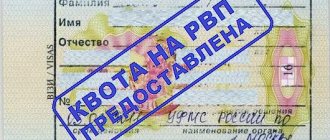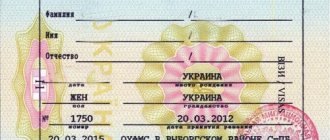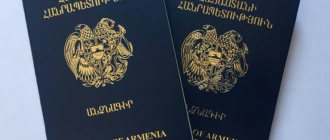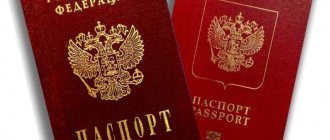Children have the opportunity to receive it immediately after birth, but many parents are in no hurry if there is no need to engage in this procedure. When a teenager turns 14 and receives a passport, it becomes necessary to confirm Russian citizenship. Citizenship will also be required when parents are planning to travel abroad with a child and when receiving maternity capital.
Grounds for obtaining Russian citizenship in accordance with the Constitution and federal laws:
- The parents are Russians, and the place of birth of the baby is not important.
- One of the parents of a small child has Russian citizenship, and the other is a foreigner.
- Foreign parents live permanently in Russia, and the state from which they came does not accept the children’s affiliation.
- Parental absence for 6 months.
Stages of registration
When obtaining Russian citizenship, the following stages of registration are used:
- Collecting documents and receiving notification of the likely receipt of Russian citizenship within three months.
- Submission of an application for admission, written in two copies in Russian.
- Calculation of government fees charged.
- Submitting a complete package of collected documents to the police department at your place of residence.
- Receiving an issued passport.
The nationality of children can be changed in accordance with the following norms of current Russian legislation:
- When parents have a Russian passport, and children only receive citizenship after their father or mother applies to the FMS.
- When the first parent is a foreigner and the second is a Russian citizen, their child receives a Russian passport.
- If one of the parents is deprived of citizenship, and the second remains a Russian citizen, their child remains a citizen of the Russian Federation.
- In circumstances in which the exchange of citizenship of a minor is excluded, when the citizenship of parents who have already been deprived of parental rights by decision of justice has been exchanged.
Establishment or termination of Russian citizenship is carried out only with the consent of a child who has reached the age of 14.
Benefits when admitting Russian citizenship to children and incapacitated persons
Children under the age of eighteen and incompetent persons who are foreign citizens or stateless persons are admitted to citizenship of the Russian Federation in a simplified manner without complying with the requirements of Part 1 of Article 13 of the Federal Law of the Russian Federation “On Citizenship”, that is, in the absence of the following conditions:
- obtaining a residence permit and a five-year period of residence;
- obligations to comply with the Constitution and legislation of the Russian Federation;
- having a legal source of livelihood;
- applying to the authorities of a foreign state with an application to renounce their other citizenship;
- without proof of Russian language proficiency.
Changing the citizenship of a child upon adoption
If a child is adopted by citizens of other countries, then he retains Russian citizenship. Also, if two adoptive parents renounce Russian citizenship, the children retain their citizenship of our country. A difficult problem is establishing the citizenship of children who are under the guardianship or trusteeship of citizens of a foreign state.
Child citizenship is required in the following cases:
- obtaining a medical insurance policy;
- registration at the military registration and enlistment office;
- registration in the living space with entry into the FMS database;
- registration of the child in various educational institutions;
- bank lending;
- registration of a pension certificate.
Important!
When a mother, who is a citizen of a foreign country, takes Russian citizenship, then, in accordance with her application in a simplified regime, the son or daughter will also be Russian citizens.
Features of changing the citizenship of children and incapacitated persons
Russian legislation establishes the following rules for changing the citizenship of a child upon acquisition or termination of citizenship of the Russian Federation by one of his parents:
· if one of the parents who has a different citizenship acquires citizenship of the Russian Federation, their child living on the territory of the Russian Federation may acquire citizenship of the Russian Federation upon the application of his parent acquiring citizenship of the Russian Federation;
· if one of the parents with a different citizenship acquires citizenship of the Russian Federation, their child living outside the Russian Federation may acquire citizenship of the Russian Federation upon the application of both of his parents;
· if one of the parents, who has a different citizenship, acquires citizenship of the Russian Federation, and the other parent is a stateless person, their child can acquire citizenship of the Russian Federation upon the application of his parent acquiring citizenship of the Russian Federation;
· if one of the parents acquiring citizenship of the Russian Federation is a stateless person, and the other parent has a different citizenship, their child can acquire citizenship of the Russian Federation upon the application of both of his parents;
· if the citizenship of the Russian Federation of one of the parents is terminated, and the other parent remains a citizen of the Russian Federation, their child retains citizenship of the Russian Federation. The citizenship of the Russian Federation of a child may be terminated simultaneously with the termination of the citizenship of the Russian Federation of one of the parents, provided that the other parent, who is a citizen of the Russian Federation, has given written consent, and provided that the child does not become stateless.
When adopted, the citizenship of children is governed by the following rules:
· a child who is a citizen of the Russian Federation, when adopted by foreign citizens or a foreign citizen, retains citizenship of the Russian Federation. The citizenship of the Russian Federation of a child adopted by foreign citizens or a foreign citizen may be terminated in a general manner upon the application of both adoptive parents or the only adoptive parent, provided that the child does not become stateless;
· a child adopted by a citizen of the Russian Federation, or spouses who are citizens of the Russian Federation, or spouses, one of whom is a citizen of the Russian Federation and the other a stateless person, acquires citizenship of the Russian Federation from the date of his adoption, regardless of place of residence of the child at the request of the adoptive parent, who is a citizen of the Russian Federation;
· a child adopted by spouses, one of whom is a citizen of the Russian Federation and the other has a different citizenship, may acquire citizenship of the Russian Federation in a simplified manner upon the application of both adoptive parents, regardless of the child’s place of residence.
Citizenship of children and incapacitated persons over whom guardianship or trusteeship is established:
· children and incapacitated persons over whom guardianship or trusteeship of a citizen of the Russian Federation has been established acquire citizenship of the Russian Federation in a simplified manner upon the application of a guardian or trustee;
· a child or incompetent person who is under full state care in an educational or medical institution, social welfare institution or other similar institution of the Russian Federation acquires citizenship of the Russian Federation in a simplified manner upon the application of the head of the institution in which the child or incompetent person is kept;
· a child or incompetent person over whom guardianship or trusteeship of a foreign citizen acquiring citizenship of the Russian Federation has been established may acquire citizenship of the Russian Federation simultaneously with the specified citizen upon his application;
· a child or incapacitated person who is a citizen of the Russian Federation and over whom guardianship or trusteeship of a foreign citizen has been established retains citizenship of the Russian Federation.
Cancellation of the decision on admission to citizenship, on termination of citizenship. The decision to acquire or terminate Russian citizenship is subject to cancellation if it is established that this decision was made on the basis of forged documents or knowingly false information submitted by the applicant. The fact of using forged documents or reporting knowingly false information is established in court. The cancellation of these decisions is carried out by the President of the Russian Federation or another authorized body.
Bodies in charge of matters of citizenship of the Russian Federation:
· President of Russian Federation;
· the federal executive body in charge of internal affairs and its territorial bodies;
· the federal executive body in charge of foreign affairs, and diplomatic missions and consular offices of the Russian Federation located outside the Russian Federation.
Normative legal acts
On citizenship of the Russian Federation: Federal Law of May 31, 2002 // Collection of Legislation of the Russian Federation. 2002. No. 22. Art. 2031.
Regulations on the procedure for considering issues of citizenship of the Russian Federation. Approved by the Decree of the President of the Russian Federation of April 10, 1992 // Collection of acts of the President and Government of the Russian Federation. 1994. No. 4. Art. 302.
Regulations on the procedure for granting political asylum in the Russian Federation. Approved by the Decree of the President of the Russian Federation of July 21, 1997 // Collection of legislation of the Russian Federation. 1997. No. 30. Art. 3601.
On the procedure for leaving the Russian Federation and entering the Russian Federation for citizens of the Russian Federation: Federal Law of August 15, 1996 // Collection of Legislation of the Russian Federation. 1996. No. 34. Art. 4029.
On the state policy of the Russian Federation towards compatriots abroad: Federal Law of March 5, 1999 // Collection of Legislation of the Russian Federation. 1999. No. 22. Art. 2670.
Agreement between the Russian Federation and the Republic of Belarus on equal rights of citizens of December 25, 1998 // Rossiyskaya Gazeta. 1998. December 26.
On the ratification of the Agreement between the Russian Federation and the Republic of Kazakhstan on a simplified procedure for acquiring citizenship by citizens of the Russian Federation arriving for permanent residence in the Republic of Kazakhstan, and citizens of the Republic of Kazakhstan arriving for permanent residence in the Russian Federation: Federal Law of May 26, 1997 // Rossiyskaya Gazeta . 1997. May 29.
Agreement between the Russian Federation and the Republic of Turkmenistan on the settlement of issues of dual citizenship dated May 18, 1995 // Collection of legislation of the Russian Federation. 1996. No. 10. Art. 830.
Agreement between the Russian Federation and the Republic of Tajikistan on the settlement of issues of dual citizenship dated September 7, 1995 // Rossiyskaya Gazeta. 1996. December 18.
Literature
Golovistikova A. N. Termination of citizenship of the Russian Federation: a comparative analysis of the laws on citizenship of 1991 and 2002 // Legislation and Economics. 2005. No. 5.
Commentary on the Federal Law “On Citizenship of the Russian Federation” (article-by-article) / Ed. V.I. Shkatully. M., 2005.
Petukhov D. V. Constitutional aspects of support and protection by Russia
compatriots abroad // ZhRP. 2007. No. 10.
Petukhov D.V. The concept of the legal institution “compatriots abroad” // Constitutional and municipal law. 2007. No. 10.
Sadykov R. Acquisition of citizenship in a simplified manner // EZhUrist. 2006. No. 28.
Questions for self-control
1. Contents of the institution of deprivation of citizenship in Soviet state law.
2. Justify from the point of view of the theory of constitutional law why a subject of a federal state should not have its own citizenship.
3. Whose will is decisive when deciding on admission to citizenship of the Russian Federation - Russia or a person wishing to acquire Russian citizenship? What about when you renounce citizenship?
4. What is the meaning of honorary citizenship?
5. What are the reasons for the appearance of stateless persons? Are these reasons objective or subjective?
6. What measures are modern states taking to reduce statelessness. What is the need for such measures?
4
What makes your dreams come true? One hundred percent, unshakable confidence in your...
WHAT AND HOW THEY WRITTEN ABOUT FASHION IN MAGAZINES AT THE BEGINNING OF THE XX CENTURY The first issue of the Apollo magazine for 1909 began, in fact, with a policy statement from the magazine’s editors...
WHAT HAPPENS IN ADULT LIFE? If you are still connected to your mother in the wrong way, you are avoiding separation and independent adult existence...
WHAT IS CONFIDENT BEHAVIOR IN INTERPERSONAL RELATIONSHIPS? Historically, there are three main patterns of differences that exist between...
Didn't find what you were looking for? Use Google search on the site:
Transfer for permanent residence to another country
If the parents or guardians of a small child are foreigners or citizens of the Russian Federation, moving to a permanent place of residence in another country will be a serious reason for making changes to the child’s citizenship. In this case, it is necessary to notify the Federal Migration Service of the presence of any property abroad to which the subsequent move is planned.
It is also recommended to notify the consulate, which will issue citizenship for the child and his legal parents if they are Russian citizens or have dual citizenship.











